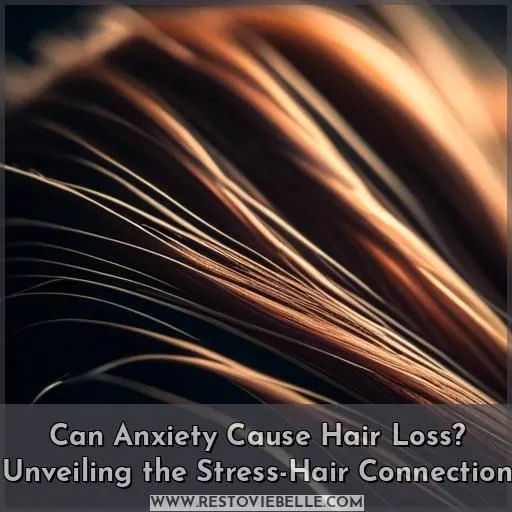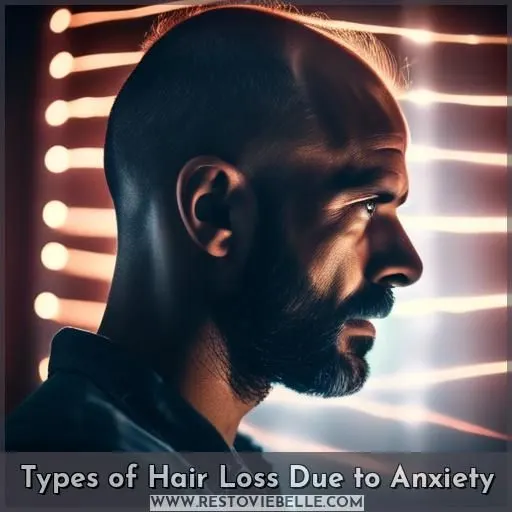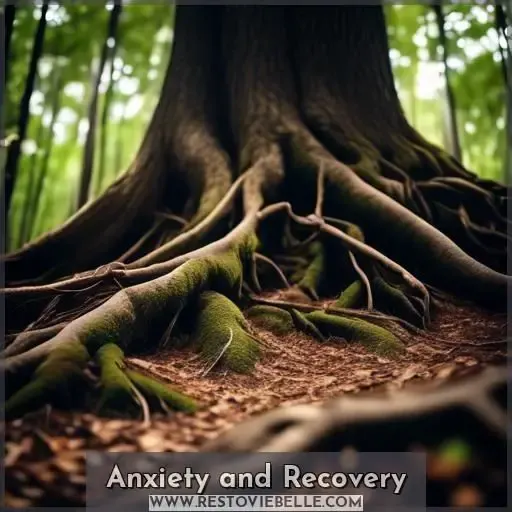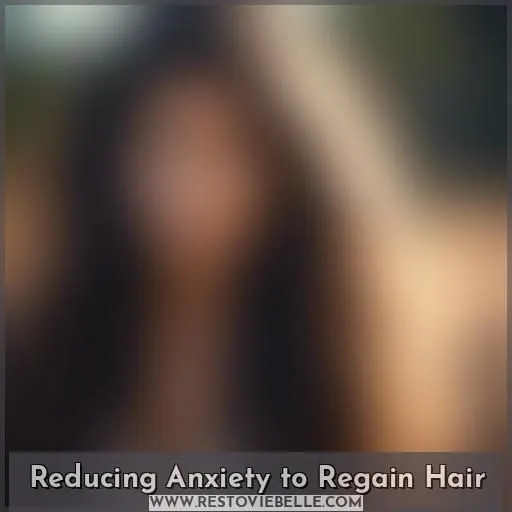This site is supported by our readers. We may earn a commission, at no cost to you, if you purchase through links.
Yes, anxiety can cause hair loss.
When you’re anxious, stress hormones impair nutrient absorption for hair growth and increase sebum production, clogging follicles.
This can trigger telogen effluvium, widespread thinning due to lowered follicle activity, or alopecia areata, patchy bald spots from sudden hair shedding.
To regain your luscious locks, identify stressors fueling hair loss, practice mindfulness techniques, and nurture yourself with relaxation.
Managing anxiety is vital – dive deeper to unearth lifestyle adjustments that cultivate a stress-free environment for your hair to thrive.
Table Of Contents
Key Takeaways
- Anxiety can cause hair loss by impairing nutrient absorption and increasing sebum production, leading to conditions like telogen effluvium and alopecia areata.
- Stress management techniques, such as mindfulness practices, can help reduce anxiety and promote hair growth.
- Identifying stressors and seeking support from friends, family, or mental health professionals can contribute to managing anxiety and hair loss.
- A healthy diet, exercise, meditation, cognitive reframing, and sleep can all support hair growth and help mitigate the effects of anxiety on hair loss.
Can Anxiety Cause Hair Loss?
Yes, anxiety can cause hair loss. Stress from anxiety often leads to conditions like telogen effluvium, alopecia areata, and trichotillomania, which can result in hair falling out.
Types of Hair Loss Due to Anxiety
Stress and anxiety can lead to different types of hair loss.
Alopecia Areata is characterized by sudden loss of hair in clumps, creating bald patches.
Telogen Effluvium is a more widespread thinning of hair due to decreased hair follicle activity.
Stress can also reduce nutrients crucial for hair growth and promote sebum production, which can clog scalp pores and hinder hair growth.
Hair loss typically occurs 6-12 weeks after a traumatic experience.
To identify stress-related hair loss, a dermatologist may examine your scalp and ask about your stress levels.
Most cases of stress-related hair loss are reversible with lifestyle changes and stress management techniques.
Anxiety and Recovery
Anxiety and recovery are intertwined. To manage anxiety and improve your overall well-being, consider these three steps:
- Identify stressors: Pinpoint the sources of your anxiety, as they may be contributing to your hair loss.
- Employ stress management techniques: Practice mindfulness, meditation, or yoga to reduce stress and promote relaxation.
- Seek support: Share your feelings with friends, family, or mental health professionals, who can offer guidance and encouragement.
Reducing Anxiety to Regain Hair
Moving from the journey of anxiety recovery, let’s delve into the sanctuary of regaining your lush locks by mitigating anxiety. Picture your mind as a garden where stress management and coping mechanisms are the water and sunlight, essential for the hair growth cycle. It’s not just about avoiding anxiety triggers but cultivating wholesome habits. Let’s sow the seeds of relaxation techniques and cognitive reframing to flourish into a stress-free zone, where telogen effluvium and trichotillomania have no chance against your fortified panic response.
| Strategy | Benefit |
|---|---|
| Meditation | Soothes the mind, reducing hair loss triggers |
| Healthy Diet | Nourishes hair from within |
| Exercise | Enhances blood flow, promoting hair growth |
| Cognitive Reframing | Changes perception of stress, safeguarding hair |
| Sleep | Restores body, aiding in hair regeneration |
Frequently Asked Questions (FAQs)
How does stress affect the hair growth cycle?
Imagine your hair follicles as delicate flowers – when life’s storms rage, they wilt and shed. Stress disrupts the growth cycle, causing hairs to halt production prematurely. But don’t fret, this phase is temporary if you nourish your roots with self-care.
What is the role of corticosterone in hair loss?
You’re on to something big! Corticosterone, that pesky stress hormone, stops dermal papilla cells from releasing GAS6 – the key that activates those hair follicle stem cells. No GAS6, no hair growth. Sneaky little culprit!
How does GAS6 activate hair follicle stem cells?
You’ll dig this: GAS6 acts like a key, opening the hair growth factory – those follicle stem cells. It activates ’em, sparking new strands to sprout. Pretty neat how one molecule flips that growth switch, huh?
What are the different types of hair loss due to stress and anxiety?
You may experience alopecia areata, with sudden bald patches, or telogen effluvium, with excessive shedding. Don’t stress—these anxiety-induced hair losses are often reversible with proper self-care.
How can stress-related hair loss be treated?
Like a bald patch in need of pruning, stress-related hair loss can be remedied. Nourish your roots: modify routines, fuel with nutrients, and practice self-care. With patience and persistence, new growth will sprout.
Conclusion
Egad, the evidence is clear – anxiety can cause hair loss! By identifying and managing stress, you can nurture your locks back to health. Implement mindfulness practices, stimulate blood flow, and nourish your hair from within.
With a little TLC, you’ll be rocking those gorgeous tresses in no time. Remember, your hair deserves the royal treatment, so treat it like the crown jewel it is.










